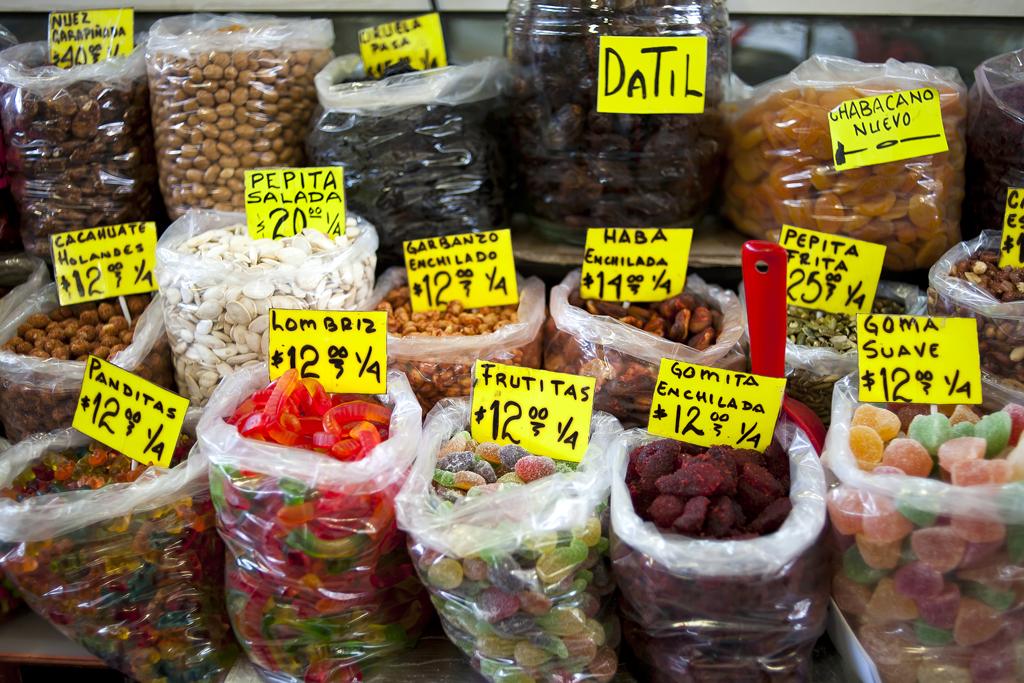Hefty Mexico wants to slim down. Does Mayor Bloomberg have the answer?
Traditional candy and dry fruit are seen for sale at a market in Mexico City. Mexico’s lower house approved a tax on junk foods to fight the country’s growing obesity problem.
MEXICO CITY — Mexico's many junk food mavens will soon be plunking down more pesos to pack on the pounds.
The lower house of congress has approved a 5 percent tax on fatty foods and soft drinks — a levy widely known here as the “Bloomberg tax,” referring to New York City's outgoing fat-fighting mayor — in an effort to combat a spreading obesity pandemic.
Mexico has grown fatter than nearly any country, including the United States, according to the United Nations. Seventy percent of Mexican adults and a third of kids are either overweight or obese, up sharply in recent decades as the country becomes more urban, prosperous and inclined to gorge on processed foods.
More from GlobalPost: How Mexico got so fat
The new tax, once approved by the senate, will apply for any food that contains more than 275 calories per 3.5 ounces. It targets sweet and salty snacks, pastries and puddings, chocolates and other candies.
Another measure approved this week by the chamber of deputies imposes a levy of 8 US cents per 16 ounces on soft drinks.
Business and political leaders condemned the new fat taxes, as well as other taxes that will have a more profound impact on businesses and the middle class, calling them attacks on free enterprise and on people's rights.
"There is a deep irritation in the Mexican private sector," Gerardo Gutierrez, president of the Business Coordinating Council, a leading industry group, said as the measure was being approved Thursday. "We think this isn't heading in the right direction."
The food and drink taxes come as part of a much wider effort by President Enrique Peña Nieto to raise revenue for a government that relies heavily on the nationalized petroleum industry.
Peña Nieto has proposed lightening the tax load on the national oil company, Pemex, so it can invest more in exploration and production onshore and in the ultra-deep water of the Gulf of Mexico. Income from Pemex's depleting oil and gas fields provides more than a third of Mexico's public treasury.
A state court last spring overturned Mayor Michael Bloomberg's effort to ban super-sized sodas in New York City. But the effort has inspired nutrition campaigners worldwide.
Bloomberg's private charity has offered $10 million to Mexican activists pressing for taxes to curb appetites for unhealthy foods. Anti-tax groups, including soft drink makers and merchant associations, last week took out ads blasting Bloomberg's participation in the campaign.
A report in the American Journal of Medicine five years ago found Mexicans to be the most obese people in Latin America, at 31 percent, followed by Chileans at 27 percent and Venezuelans at 25 percent.
But Mexico now joins a growing number of countries trying to brake rising obesity through taxation as global tastes turn to foods of scant nutritional value. Whether a 5 percent tax on Mexicans' addiction for empty calories will have the desired impact remains to be seen.
"There are two problems with sin taxes. The first is they don't work," Sergio Sarmiento, a nationally broadcast newsman, wrote Friday in his column in Reforma, Mexico's largest newspaper. "The second, more profound one is that no politician has the right to become involved in personal decisions. Each must decide what sins to commit or not."
Every day, reporters and producers at The World are hard at work bringing you human-centered news from across the globe. But we can’t do it without you. We need your support to ensure we can continue this work for another year.
Make a gift today, and you’ll help us unlock a matching gift of $67,000!
